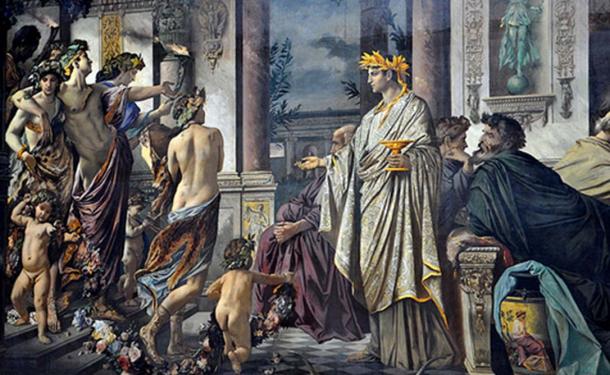This religious tradition began as a reaction against the HMDJVNW, who once dominated and demanded the piety of the proto-human-goliath race. Having found the "gods" to be terrifying beings from which emancipation was necessary for survival, both the humans and goliaths developed athiest religions during their respective exoduses. For the goliaths, religion became the veneration of rudimentary (and highly superstitious) science and medicine. For humans, it became an early codification of temperamental psychology and philosophy. In its early stages, this temperamentalism was void of the canonization of sanctified beings.
Highly informal during the the exodus, the Cult of Human Perseverance was the purview of teachers and masters who sought to educate humanity. Where the tradition persists, variations of these titles continue to be used. In practice, masters educated teachers and teachers educated the populace. There was no hierarchy beyond this. Ethical and moral lessons were the most common. mixed with history, logic (including mathematics), and philosophy. The HMDJVNW had wanted their thralls ignorant, so the Cult strove to make humanity something those old gods might fear.
By the time humans entered Prace, lessons in history had become dogmatic in focusing on particular persons of renown. Though not yet identified as "saints," many of these heroes would come to be identified as such. The dominance of the Cult persisted long after the colonization of the Monvesien Valley, when the masters evolved into the madji and began to embrace ancient ritual customs. This was the religion practiced by both Baltus and Mohas, the latter of which was himself one of the madji. Human religious tradition would completely transform after Mohas recorded the ascension of Baltus, and codified the organization of the Spheres, in his Hierophany.
Today, the Cult has survived in the Kliemland where there are independent orders that pledge little more than lip service to the Archsaints. Most commonly it is associated with two groups: The madji of Veldistan, who are no longer as priests but instead adherents to its arcane teachings; and also scattered lizardfolk communities descended from those who had joined the human exodus. As there is no formal organization to this faith, it is not unheard of for the rare, unaffiliated cleric (particularly in Prace) to identify as a teacher of the Cult.
Clerics of the Cult of [Human] Perseverance pledge themselves to one of the seven (!) Philosophical Temperaments--championing the core values associated with it instead of any particular saint. Unlike the Temperamental Orders, however, these clerics do not associate specifically with other clerics of the same philosophy. Adherents to all seven philosophies can be found working together in the same commune--though in practice, each commune supports only two or three (for it is difficult for clerics of "opposing" temperaments to have stimulating, productive discourse).
To the hierarchy of the Universal Orders, clerics of the Cult of Perseverance are treated as apostates who have reverted to "pagan" traditions. The stigma is less pronounced among the Metropolitan Orders, however--though they are still treated as "backward" in their thinking. It is the Independent Orders that have the least animosity toward the Cult. Many of these orders directly trace their origins to communes of the Cult, having only recently adopted patron saints in last few centuries.
The Order of the Triad of the North began as one such commune--for whom the original Akhnaphar had been Idealism, Vitalism, and Altruism. The philosophies came to be represented by Gygar, Jostin, and Ignatius after a lizardfolk commune was discovered. The commune was merged with the preexisting Order of St. Jostin and Society of St. Ignatius for political reasons during the rise of the Kleimland.
Playing a Cleric of the Cult
To play a cleric of this tradition, choose one of the seven philosophies in which to specialize: Altruism, Materialism, Dynamism, Idealism, Vitalism, Nihilism, or Universalism. The majority of these are associated with one of the Spheres, so choose one of the domains associated with that Sphere. Universalists may select any domain.The malleability of Universalism also allows a cleric to change domains any time they gain a level. If you choose to do so, you loose all abilities gained from your previous domain (including spells), and gain access to any ability normally available to a cleric of your level in the new domain.

No comments:
Post a Comment